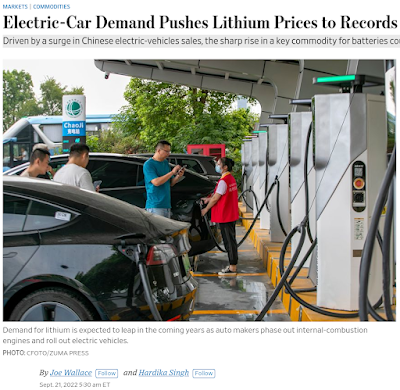My takeaway is "Look before you leap".
Not everyone is enthused about how governments are pushing green energy.
"One of the essential lessons from China’s Great Leap Forward is that catastrophic failures inevitably follow from politicians’ insistence on ignoring reason, logic, truth and economics. Europe’s current energy crisis, California’s continuing power outages and Sri Lanka’s food shortages are all warning signs. The Green Leap Forward has set humanity on a fast track to another man-made catastrophe." WSJ, Sept. 2022
Another opinion in today's WSJ bemoans the proclivity of Telsa batteries to overheat and catch fire. Who knew?





